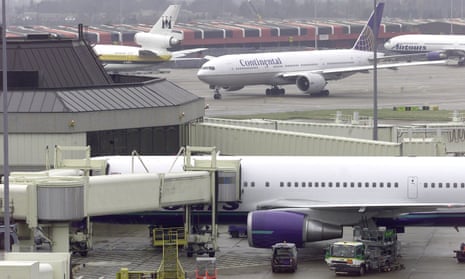The northern powerhouse risks being derailed by the government’s “absolute paranoia” over Heathrow expansion and an “over-emphasis on the south-east at the expense of everywhere else”, the managing director of Manchester airport has said.
In a stark message to Theresa May, who is due to decide this month on the contentious third runway at Heathrow airport, Ken O’Toole said ministers needed to draw up a national aviation policy to address the north-south economic divide.
“We need to be careful that the north and the UK as a whole is not overshadowed again by the south-east,” he said. “If we’re not careful that’s just going to take over.”
Ministers are set to decide later in October where to allow a new runway in the south-east of England after decades of procrastinating. Expansion at Heathrow airport is expected to be given the green light instead of a rival Gatwick airport plan, despite widespread opposition.
In an interview with the Guardian, O’Toole said he was confident May’s government was supportive of ex-chancellor George Osborne’s northern powerhouse agenda – but said there was a lack of a national aviation policy behind the strategy.
“If you really want to drive the northern powerhouse, if you really want to drive the recalibration of north and south, Heathrow ain’t the answer – it’s Manchester airport,” he said.
“I’m not sure I would isolate it to Manchester being overlooked – there seems to be this absolute paranoia or over-emphasis on the south-east to the expense of everywhere else. How can you say you’ve got a national economic strategy if your aviation strategy seems to be over-emphasised on the south-east?”
In the fierce PR battle over the third runway, Heathrow has said that expanding its airport would deliver £12.5bn of growth to the north-west compared to Gatwick’s £8.6bn by 2050. But Manchester airport bosses say it will deliver more than £70bn for the region over the same period, nearly six times the figure put forward by Heathrow.
Pointing out that the £16.8bn Heathrow scheme could take up to 20 years before it is built, O’Toole said there was “a gap in terms of an aviation policy that’s going to make best use of what’s in the UK for those 15 to 20 years while we’re waiting for something to come along”.
Manchester airport is the third-biggest in the UK and the only hub, other than Heathrow, with two runways. Twenty five million passengers travel through Manchester airport every year but it has the capacity to carry 55 million, meaning it could overtake Gatwick to become the UK’s second-biggest airport within 15 to 20 years.
The airport was at the heart of former Osborne’s northern powerhouse agenda, in part because it funnels as much as 60% of the business travel into the north of England. In October last year it hosted the Chinese president Xi Jinping on his state visit to the UK, when he launched a new direct flight from Manchester to Beijing – the first outside London.
O’Toole said the vote to leave the European Union would slow the airport’s growth because airlines and passengers “don’t like uncertainty”. “Airlines are deciding where to put planes and routes 12 to 18 months in advance,” he said. “The longer the uncertainty goes on the more likely that the UK misses out.”
He urged Brexit minister David Davis to urgently clarify whether Britain will seek to remain part of the historic EU open skies deal, which lets airlines fly from anywhere in the US to anywhere in the EU. Withdrawing from the deal would potentially mean airlines such as easyJet or Jet2 having to negotiate individual deals for each country they fly to.
O’Toole, who is on the board of Manchester Airports Group, which owns London Stansted, east Midlands and Bournemouth airports, described the government’s aviation policy to date as “some progress, but a lot more to do”.
He said: “Do we have integrated road, rail and airports? No. Do we have a taxation regime that supports and encourages airlines to bring capacity into the UK? No.
“Do we have an immigration service that while protecting the border, which is critical, actually makes it easy and appealing for people to visit the UK? I contend we don’t.
“Is it easy, cheap, quick and convenient to gain a visa to the UK? Again, it’s improved. I’m not saying there isn’t progress being made but there is a lot more that could be done.”

Comments (…)
Sign in or create your Guardian account to join the discussion